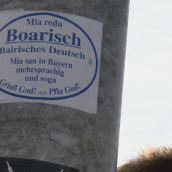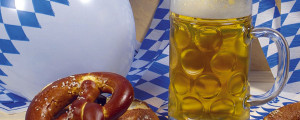Posted by trachten in Bavaria, Dirndl and Lederhosen, Oktoberfest, slider | Comments Off on Bavarian dialect – better than German
Bavarian dialect – better than German

Germans from other parts of the country will tell you all kinds of horror stories about Bavarian dialect: impossible to understand, even more impossible to speak, and all around you whenever you’re in Munich. And if you’ve already learned standard German to an advanced level, you’ll probably agree.
On the other hand, if you’re just an average British person with little or no knowledge of German, you’re starting from zero, so there’s nothing particularly difficult about Bavarian dialect. In fact, if you’re going to learn any form of German, you might just as well make it this one – after all, it’s more likely to get used than dusty old phrases from GCSE German like “Wie komme ich zur Post?”
Bavarian dialect certainly is different to standard German. If you’re from Berlin or Hamburg or Düsseldorf in the North, the sound of it is a bit like a strong Scottish accent: and just like the Scots, the Bavarians are a proud bunch who’ve never forgotten that they once were an independent country and for whom the way they speak makes up a part of their identity.
All the better to get down and learn a few useful Bavarian phrases, then, if you want to be popular with the waitresses at the Oktoberfest! Here a few snippets that might come in handy, with phonetic pronunciation so that you can have a go at speaking them authentically.
A Mass, biddeschee – A mass, biddeschay – A tankard of beer, please
und a halbes Hendl dozu – Uhnd a halbez hendel dotsu – And half a roast chicken with that
Mei, schick‘s Diandlgwond! – My, shicks deeandelgwond – My, what a snappy dirndl!
Des is a fesche Ledahosn! – Dez iz a feshe laydahosen – That is a fetching pair of lederhosen!
I mog di – Ee mogg dee – I like you (a lot…)
As you’ll notice, there’s a few points at which Bavarian comes even closer to English than standard German, like saying “a” instead of “ein”, or words like “fesch”. In terms of pronunciation, with words like “Diandlgwond” – as odd as this may sound – try imitating a clichéd Rastafarian accent: if you’ve ever heard someone from Brixton say “gwan”, you’ve got an advantage over other learners of Bavarian – i.e. over most Germans!


